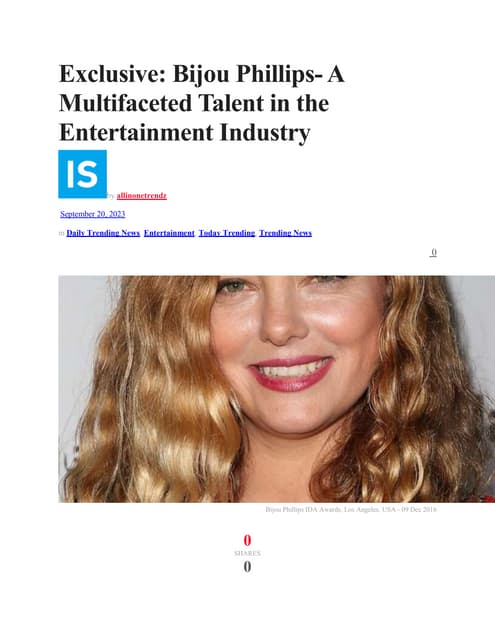
The Bobbi Althoff Video: A Viral Sensation and Its Ethical Implications
In the ever-shifting landscape of social media, few incidents have sparked as much discussion around privacy and consent as the recent leaked video involving influencer Bobbi Althoff. This video, purportedly containing sensitive content featuring Althoff, has ignited a firestorm of debate around the ethics of sharing content without consent and the implications of digital manipulation. As Althoff's likeness and voice are manipulated in ways she never agreed to, the incident raises crucial questions about the reliability of visual content in our digital age and the challenges faced by content creators in safeguarding their identities.

The Incident that Sparked Outrage
The video quickly circulated across multiple platforms, drawing attention not only for its explicit content but also for the ethical questions it raised. Althoff, who gained prominence as a social media influencer, found herself thrust into a spotlight she never consented to. While the specifics of the video remain somewhat murky, its impact is undeniable—leading to widespread conversations about digital consent, privacy violations, and the power dynamics inherent in influencer culture.
According to a report by Truth or Fiction, the Bobbi Althoff video serves as a prime example of how digital content can be manipulated. The video showcased her in scenarios she had never been a part of, effectively creating a deepfake that misused her image and voice. As digital content grows increasingly sophisticated, it poses a serious threat to personal privacy.
Understanding the Digital Landscape
The incident touches on broader themes of how viral content operates in the digital age. With social media platforms acting as the primary battleground for content, the lines between public persona and private life are continuously blurred. For creators like Althoff, this situation underscores the importance of understanding the digital landscape and the implications of viral fame.
In a world where every post, image, or video has the potential to go viral, the stakes are incredibly high. A study highlighted by Truth or Fiction found that more than 60% of respondents felt that social media platforms should implement stricter regulations on content sharing, especially when it concerns personal privacy. This sentiment echoes the urgent need to establish guidelines that protect creators from unauthorized use of their likenesses.
The Ethics of Sharing Content
As the Bobbi Althoff incident unfolds, it's crucial to explore what ethical considerations are at play. The ethics of sharing content without consent raises the question: what responsibility do creators and platforms have to protect individuals from the misuse of their image and voice?
In the case of Althoff, the potential harm extends beyond mere embarrassment. The manipulation of her likeness could lead to reputational damage, harassment, and psychological distress. Influencers, who often share personal aspects of their lives for public consumption, are particularly vulnerable to this kind of exploitation. As described by digital rights advocates, this incident represents a "canary in the coal mine" for problems that many creators face.
The Role of Platforms
Social media platforms are increasingly being called upon to take accountability for the content shared on their sites. As the incident gained traction, many users began to question whether companies like Instagram and TikTok should have stricter policies to prevent such videos from circulating unchecked. The general consensus among experts is clear: implementing more rigorous content moderation policies could mitigate the risks of harmful content going viral.
Furthermore, the prevalence of deepfake technology complicates the matter. According to a report from the Brennan Center for Justice, deepfakes are becoming increasingly accessible, making it easier for malicious actors to manipulate visual content. This raises an urgent need for legal frameworks to address the unauthorized use of someone's likeness, as existing laws often fail to keep pace with technology.
The Power of Viral Sensations
The Bobbi Althoff video exemplifies the double-edged sword of virality. While the potential for fame can be appealing, it often comes with unforeseen consequences. For Althoff, this incident could significantly alter her career trajectory and the way she interacts with her audience. As she navigates this challenging landscape, her experience offers a valuable learning opportunity for fellow content creators.
The viral nature of the incident also serves as a reminder of the transitory attention span of online audiences. According to statistics from Statista, approximately 40% of internet users are likely to forget content they've seen within a week. This fleeting nature of attention means that the fallout from such incidents may be short-lived, but the psychological scars can linger much longer.
Reflections on Privacy and Consent
As we reflect on the implications of the Bobbi Althoff incident, it’s essential to consider the impact of viral content on our understanding of privacy and consent. The landscape of digital content creation is evolving rapidly, and with it, the ethical considerations that accompany it must also adapt. This incident brings to the forefront the importance of establishing clear boundaries in a world where personal images and voices can easily be manipulated.
Moreover, audience responsibility cannot be overlooked. Viewers play a role in perpetuating harmful practices by consuming and sharing sensationalized content without considering the implications. As discussed in a recent symposium on digital ethics, it is vital for audiences to critically engage with the content they consume and understand its origins.
Moving Forward
The Bobbi Althoff video is more than just a viral sensation—it serves as an essential case study in the ethical complexities of the digital age. As social media continues to shape our lives in unprecedented ways, it is crucial for both creators and consumers to navigate this landscape with greater awareness and responsibility.
As Althoff and her followers grapple with the fallout from this incident, it is imperative to engage in ongoing discussions about consent, privacy, and the ethical responsibilities of both creators and platforms. The incident poses a critical question: how do we ensure that digital spaces remain safe and respectful for all?
In conclusion, the Bobbi Althoff incident invites us to reflect on our roles as digital citizens. Whether you’re a creator or a consumer, understanding the implications of sharing and viewing content is essential in fostering a respectful digital environment. The conversation is just beginning, and as we move forward, it’s vital to advocate for changes that protect individuals from the vulnerabilities of the digital landscape.
As we continue to navigate this digital frontier, the lessons learned from the Bobbi Althoff incident will undoubtedly resonate within the broader discussions of digital ethics, privacy rights, and the responsibility of social media platforms in the age of misinformation.
For further insights on the implications of viral content, you can explore more on Truth or Fiction.